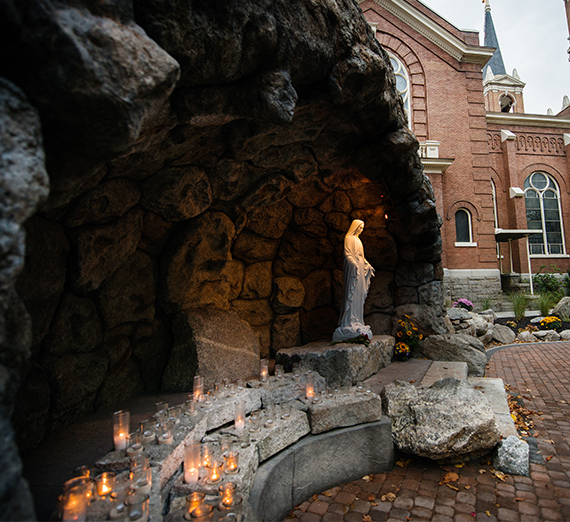A Crisis of Confidence

In the last few months, the serious question of how the hierarchy of the Catholic Church has, or has not, responded to reports of sexual abuse has moved once more to the forefront of worldwide conversation. Our concern first and foremost is for those whose lives and families have been tragically impacted by the trauma of abuse, and how we can stand in solidarity with them.
For us – a Catholic, Jesuit institution – the seemingly widespread incidence of sexual abuse perpetrated by clergy has been disturbing and hurtful in many ways. The crisis of confidence in Catholic leaders is a cause of deep concern and anxiety, and it is the unequivocal focus of every ecclesial gathering.
Ever since late summer (2018), these matters have been a significant weight upon my mind and my heart. I felt compelled to make mention of this in my reflection at this year’s Mass of the Holy Spirit. Earlier this fall, I shared the following four expressions with our faculty, staff, and students as a framework to contemplate how we – as a community dedicated to this University and its Catholic, Jesuit foundation – are discerning and responding to these challenges.
First: Our commitment to the human dignity of every member of the community.
In our Mission and Ministry initiatives at Gonzaga, we have been clear that the University – in following the teachings of Christ Jesus, and advancing the charism of the Society of Jesus – is deeply committed to policies and practices that reflect the dignity of the human person, justice, and solidarity with the poor and vulnerable. Indeed, this circumstance can represent a renewed call to all of us to affirm the dignity of all people, and to imagine the ways in which we can actively stand in solidarity with those who have suffered from abuse of any kind. The awareness that incidents of harassment, abuse, and inappropriate sexual conduct do occur serve as an opportunity to underscore and reaffirm Gonzaga’s unwavering commitment to ethically, legally, and responsibly address all incidents that come to our attention.
Second: The commitment of the Jesuits West Province, and the Diocese of Spokane, to zero tolerance for sexual misconduct.
Both the Jesuits and the Spokane Diocese have had policies and protocols, as well as a process for responding to reports of abuse by members of the clergy, in place since 2002. These processes include the active involvement of lay (non-religious) professionals and lay Advocacy Coordinators. In the wake of the Pennsylvania Report, the Provincial of Jesuits West, Rev. Scott Santarosa, S.J, has reaffirmed his commitment to fully and completely adhere to the Province’s no tolerance policy. In the same way, Bishop Thomas E. Daly of the Diocese of Spokane has also recently issued a statement in the form of a video message regarding the ongoing abuse crisis in the Church.
Third: A commitment to equal access to education, and solidarity with victims of abuse and neglect.
We as a community must remain committed to creating the kind of environment wherein all individuals — regardless of race, color, religion, national origin, sex, sexual orientation, gender identity, age, ability, marital or veteran’s status — have a fair, equal opportunity to be nourished and supported in the pursuit of educational goals. We must continuously work at educating ourselves and each other about the various expressions of bias, harassment and abuse, and hold those who are found to have violated our commitments accountable. We must also have the courage to stand in solidarity with those who are suffering. Fully repairing the pain of abuse may never be possible, but we must be and remain committed to continuously love, care for and protect members of our community, and resolve to seek justice.
Fourth: A call for us to engage these structural issues as a learning community.
It seems to me that this present moment affords an opportunity for us, as a community of students, alumni, friends, parents, and employees, to engage courageously in difficult conversations about what systematic abuse within the Church compels us to learn, to know, and to do. Referencing Luke’s Gospel, as an apostolic work of the Society and the Church, we are all called to be apostles, those who go out and are known as bearers of the Good News. On campus, we have and will continue to offer opportunities for intellectual engagement on this important matter, including guest lectures, panel discussions and related events. We will be sure to call out those that are open to our entire community as well as any specific programming for alumni, parents and friends of the university.
As president and director of this Jesuit work, I affirm the commitment that stands at the heart of our Mission and our purpose: to work together, every day, to create a university dedicated to supporting and facilitating the educational aspirations of each and every member, and doing this work in the context of a community of care, responsibility and accountability. As individuals and as a university, we are reminded that we have been called to be a people of hope, and a people of action, guided by the timeless message of the Gospel. Let this time be a reminder of this, and a call for each of us to bring light and hope to each other, and to the world.
Sincerely yours,
Thayne M. McCulloh
President
